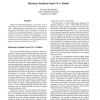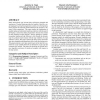252 search results - page 42 / 51 » Why teach programming languages |
ICFP
2007
ACM
16 years 12 days ago
2007
ACM
In the light of evidence that Haskell programs compiled by GHC exhibit large numbers of mispredicted branches on modern processors, we re-examine the "tagless" aspect of...
APLAS
2009
ACM
15 years 7 months ago
2009
ACM
We present a simple algorithmic extension of the classical call-strings approach to mitigate substantial performance degradation caused by spurious interprocedural cycles. Spuriou...
ASPLOS
1996
ACM
15 years 4 months ago
1996
ACM
New high-speed networks greatly encourage the use of network memory as a cache for virtual memory and file pages, thereby reducing the need for disk access. Becausepages are the f...
DATE
1999
IEEE
15 years 4 months ago
1999
IEEE
Software programming languages, such as C/C++, have been used as means for specifying hardware for quite a while. Different design methodologies have exploited the advantages of f...
117
Voted
DLS
2008
15 years 2 months ago
2008
Static and dynamic type systems have well-known strengths and weaknesses. Gradual typing provides the benefits of both in a single language by giving the programmer control over w...


